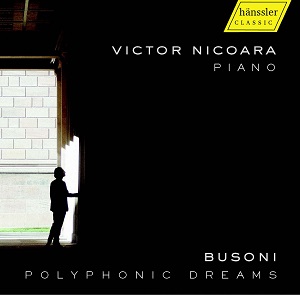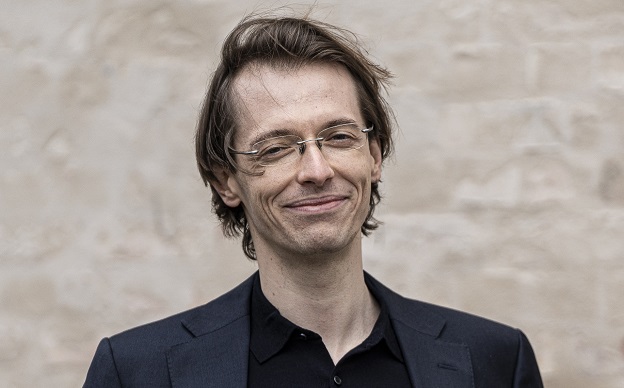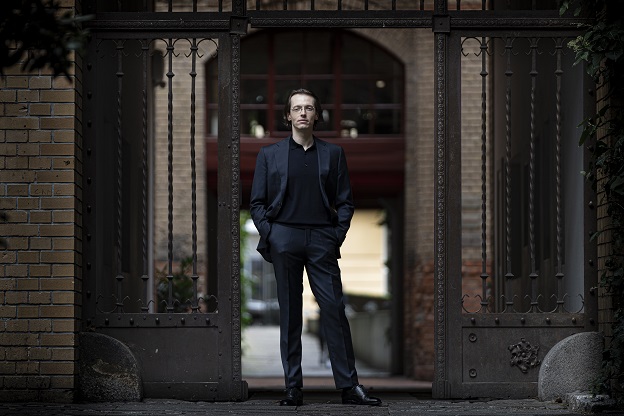Victor Nicoara, in 2021, you released your debut album: a Busoni recording. Now the next album is being released, and once again one name dominates the program: Busoni. What is it about this composer’s music that draws you back to it again and again?
The expressive dimension of much of Busoni’s music – ranging from mystical introspection to terrifying grandeur (the latter more sparingly used) – is something that always feels familiar to my emotional makeup. Then, there is a certain elusiveness to Busoni’s music, a certain ambiguity that lends itself to different interpretations: although there are many constants running through his oeuvre, each work inhabits a unique world. These aspects have kept me constantly engaged with this music. Therefore, after recording the sonatinas, I still had the hunger to perform and record even more of it. That hunger stays with me even now, after a second recording.
In 2024, we commemorated the centenary of Ferruccio Busoni’s death. What does his music still have to say us today?
It is cosmopolitan music for a cosmopolitan age. Busoni’s omnivorous taste connects very well to the more inclusive aesthetic of today. It can bring an added encouragement to create music that needn’t close itself off from a particular genre, epoch or musical material: to be and stay open-minded. On the expressive side, it can also inspire us to find intense meaning in that which might be understated.
You are a composer yourself and have included some of your own pieces on both of your albums. In previous centuries, it was a matter of course for a pianist to also compose, but today it has become rare. Is this due to modern university training, which strictly separates performance and composition?
I can think of two interlinked processes that pushed towards this: the decline of the performer-composer as a serious, modern artistic pursuit in the early 20th century and the consolidation of a standard repertoire of canonized classics with its increased emphasis on being true to the urtext score and the composer’s intentions. Educational specialization was certainly a factor, responding to both the aforementioned cultural trends and to the similar separation of other subjects in higher education. This specialization has raised standards and competition significantly. Some can excel in several departments with apparent ease – one can think of Thomas Adès or Jörg Widmann, for example – but for most, it is very hard work. After all these years, I still find it a challenge to juggle both activities simultaneously. They both compete for time and, more importantly, mental space.
During his lifetime, Busoni was highly esteemed as a pianist, but as a composer he was rather controversial. Most people today know almost only Busoni’s romantic Bach arrangements. What would you recommend as the first piece if someone wanted to get to know Busoni for the first time?
Busoni’s style could shift a fair bit from one piece to the next, thus any one choice would not be wholly representative of his range and might give the listener false expectations. A collection of pieces would work best – the 6 sonatinas give quite a comprehensive overview of his music. But if it has to be one piece to lure the new listener into Busoni’s world, then it should be his finest: the Berceuse élégiaque. Ideally heard at least twice.
You live in Berlin, where Busoni also spent a large part of his final years. Have you ever followed in Busoni’s footsteps? Are there special ‘Busoni memorial places’, perhaps even some that are not necessarily mentioned in travel guides, where you would say, ‘The spirit of Busoni still lives here today’?
I doubt travel guides would lead you to the Staatsbibliothek zu Berlin on Unter den Linden, but there you would find Busoni’s estate. Looking through manuscripts and letters, one can marvel at Busoni’s beautiful penmanship while being in contact with the very same paper he wrote on. Occasionally you stumble upon an unexpected slice of daily life, such as sketches explaining to his mother how daylight hours change dramatically over the year in Helsinki, or the menu for a sumptuous course meal in a Zurich restaurant, with musical sketches scribbled on the reverse side. Therein lies some spirit.
 On your new album, entitled ‘Polyphonic Dreams’, you have recorded one of Busoni’s major works, the ‘Fantasia Contrappuntistica’, in an edition you created yourself. What distinguishes your version from other editions of this musically and historically influential work?
On your new album, entitled ‘Polyphonic Dreams’, you have recorded one of Busoni’s major works, the ‘Fantasia Contrappuntistica’, in an edition you created yourself. What distinguishes your version from other editions of this musically and historically influential work?
Busoni himself was responsible for three separate editions of this work, two for solo piano and one for two pianos. They all differ: in some areas radically, in others not at all. I attempted to integrate nearly all of the existing material in an “expansive” version. In order to best achieve this integration, I also resorted to some composition where I added a few bars of my own that I believe fit within the structure of the piece – not unlike what Busoni himself did with many editions and arrangements of other composers’ music. It is not an urtext edition, but it represents my unified interpretative overview of the work’s different iterations, executed in the Busonian editorial spirit.
In addition to other Busoni works, you have also selected pieces by the composers Benedict Mason, Larry Sitsky and one of your own pieces for the album. How did that come about?
Interconnectivity, or even “the omnipresence of time”, to quote Busoni, is an important part of my concept for this album. Busoni is in constant dialogue with past composers and their works in his music and I wished to showcase how some of his posthumous colleagues could in the same way be in a dialogue with him. Larry Sitsky has always had a very strong link to Busoni, in his music and writings. His Nocturne canonique from this album references the second of Busoni’s ‘Seven short pieces for the cultivation of polyphonic playing’. Long ago, Benedict Mason wrote a Busoni inspired piece for my teacher Andrew Ball, who introduced me to Busoni’s music, and he kindly agreed to repeat that process for me. His work alludes to the seventh of the seven aforementioned pieces.
What are your future career plans? Will you remain loyal to Busoni as a pianist or will audiences also hear different music from you in the future?
I have already played quite a bit of Busoni and I plan to continue doing so, filling the gaps of pieces I have not yet performed along the way. However in my concert programs, I do tend to mix Busoni’s music with pieces by other composers. Bach, Mozart and Liszt, his favorites, work very well in that context. At the moment I am working on a fair bit of Chopin for some performances this Autumn and for next year I am planning a French program. Aside from that, the composers Philipp Jarnach (a protégé of Busoni) and E.W. Korngold have been slowly gaining ground in my repertoire.
How do concert organizers react when you offer them Busoni’s music? Is there still interest in performing this music, which is reported to sometimes overwhelm some listeners?
As I have learned from experience, Busoni is not a composer that every organizer would be ready to program. I am, though, happy to say that there are not a few who are either very curious about this music which they might not really know but would like to take a chance on (real heroes of the musical ecosystem!) and others who do know it and are really happy that someone suggested it. I have been doing spoken introductions for all my concerts for a few years now and judging by the feedback, I would say that it helped most of my audience embrace even the most challenging of Busoni’s works.
https://www.pizzicato.lu/der-erbe/



















